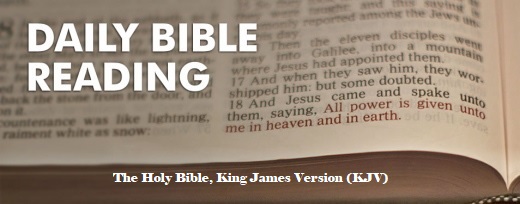The Daily Readings
FRIDAY, September 25, 2020
Psalm 78:1-4, 12-16; Numbers 20:1-13; Acts 13:32-41
The Holy Bible, King James Version (KJV)
Today’s Verse-of-the-Day:
My little children, these things write I unto you, that ye sin not. And if any man sin, we have an advocate with the Father, Jesus Christ the righteous:We have an Advocate with the Father; one who has undertaken, and is fully able, to plead on behalf of everyone who applies for pardon and salvation in his name, depending on his pleading for them. He is “Jesus,” the Saviour, and “Christ,” the Messiah, the Anointed. He alone is “the Righteous One,” who received his nature pure from sin, and as our Surety perfectly obeyed the law of God, and so fulfilled all righteousness. All men, in every land, and through successive generations, are invited to come to God through this all-sufficient atonement, and by this new and living way. The gospel, when rightly understood and received, sets the heart against all sin, and stops the allowed practice of it; at the same time, it gives blessed relief to the wounded consciences of those who have sinned.
Today’s Readings:
Recounting God’s power
1 Give ear, O my people, to my law: incline your ears to the words of my mouth.These are called dark and deep sayings, because they are carefully to be looked into. The law of God was given with a particular charge to teach it diligently to their children, that the church may abide forever. Also, the providences of God, both in mercy and in judgment, might encourage them to conform to the will of God. The works of God much strengthen our resolution to keep his commandments. Hypocrisy is the high road to apostasy; those that do not set their hearts right, will not be steadfast with God. Many parents, by negligence and wickedness, become murderers of their children. But young persons, though they are bound to submit in all things lawful, must not obey sinful orders, or copy sinful examples.
2 I will open my mouth in a parable: I will utter dark sayings of old:
3 Which we have heard and known, and our fathers have told us.
4 We will not hide them from their children, shewing to the generation to come the praises of the Lord, and his strength, and his wonderful works that he hath done.
12 Marvellous things did he in the sight of their fathers, in the land of Egypt, in the field of Zoan.
13 He divided the sea, and caused them to pass through; and he made the waters to stand as an heap.
14 In the daytime also he led them with a cloud, and all the night with a light of fire.
15 He clave the rocks in the wilderness, and gave them drink as out of the great depths.
16 He brought streams also out of the rock, and caused waters to run down like rivers.
Another story of water from the rock
20:1 Then came the children of Israel, even the whole congregation, into the desert of Zin in the first month: and the people abode in Kadesh; and Miriam died there, and was buried there.After thirty-eight years' tedious abode in the wilderness, the armies of Israel advanced towards Canaan again. There was no water for the congregation. We live in a wanting world, and wherever we are, must expect to meet with something to put us out. It is a great mercy to have plenty of water, a mercy which, if we found the want of, we should more own the worth of. Hereupon they murmured against Moses and Aaron. They spake the same absurd and brutish language their fathers had done. It made their crime the worse, that they had smarted so long for the discontent and distrusts of their fathers, yet they venture in the same steps. Moses must again, in God's name, command water out of a rock for them; God is as able as ever to supply his people with what is needful for them. But Moses and Aaron acted wrong. They took much of the glory of this work of wonder to themselves; “Must we fetch water?” As if it were done by some power or worthiness of their own. They were to speak to the rock, but they smote it. Therefore it is charged upon them, that they did not sanctify God, that is, they did not give to him alone that glory of this miracle which was due unto his name. And being provoked by the people, Moses spake unadvisedly with his lips. The same pride of man would still usurp the office of the appointed Mediator; and become to ourselves wisdom, righteousness, and sanctification, and redemption. Such a state of sinful independence, such a rebellion of the soul against its Saviour, the voice of God condemns in every page of the gospel.
2 And there was no water for the congregation: and they gathered themselves together against Moses and against Aaron.
3 And the people chode with Moses, and spake, saying, Would God that we had died when our brethren died before the Lord!
4 And why have ye brought up the congregation of the Lord into this wilderness, that we and our cattle should die there?
5 And wherefore have ye made us to come up out of Egypt, to bring us in unto this evil place? it is no place of seed, or of figs, or of vines, or of pomegranates; neither is there any water to drink.
6 And Moses and Aaron went from the presence of the assembly unto the door of the tabernacle of the congregation, and they fell upon their faces: and the glory of the Lord appeared unto them.
7 And the Lord spake unto Moses, saying,
8 Take the rod, and gather thou the assembly together, thou, and Aaron thy brother, and speak ye unto the rock before their eyes; and it shall give forth his water, and thou shalt bring forth to them water out of the rock: so thou shalt give the congregation and their beasts drink.
9 And Moses took the rod from before the Lord, as he commanded him.
10 And Moses and Aaron gathered the congregation together before the rock, and he said unto them, Hear now, ye rebels; must we fetch you water out of this rock?
11 And Moses lifted up his hand, and with his rod he smote the rock twice: and the water came out abundantly, and the congregation drank, and their beasts also.
12 And the Lord spake unto Moses and Aaron, Because ye believed me not, to sanctify me in the eyes of the children of Israel, therefore ye shall not bring this congregation into the land which I have given them.
13 This is the water of Meribah; because the children of Israel strove with the Lord, and he was sanctified in them.
Through Jesus forgiveness is proclaimed
13:32 And we declare unto you glad tidings, how that the promise which was made unto the fathers,The resurrection of Christ was the great proof of his being the Son of God. It was not possible he should be held by death, because he was the Son of God, and therefore had life in himself, which he could not lay down but with a design to take it again. The sure mercies of David are that everlasting life, of which the resurrection was a sure pledge; and the blessings of redemption in Christ are a certain earnest, even in this world. David was a great blessing to the age wherein he lived. We were not born for ourselves, but there are those living around us, to whom we must study to be serviceable. Yet here is the difference; Christ was to serve all generations. May we look to Him who is declared to be the Son of God by his resurrection from the dead, that by faith in him we may walk with God, and serve our generation according to his will; and when death comes, may we fall asleep in him, with a joyful hope of a blessed resurrection.
33 God hath fulfilled the same unto us their children, in that he hath raised up Jesus again; as it is also written in the second psalm, Thou art my Son, this day have I begotten thee.
34 And as concerning that he raised him up from the dead, now no more to return to corruption, he said on this wise, I will give you the sure mercies of David.
35 Wherefore he saith also in another psalm, Thou shalt not suffer thine Holy One to see corruption.
36 For David, after he had served his own generation by the will of God, fell on sleep, and was laid unto his fathers, and saw corruption:
37 But he, whom God raised again, saw no corruption.
38 Be it known unto you therefore, men and brethren, that through this man is preached unto you the forgiveness of sins:
39 And by him all that believe are justified from all things, from which ye could not be justified by the law of Moses.
40 Beware therefore, lest that come upon you, which is spoken of in the prophets;
41 Behold, ye despisers, and wonder, and perish: for I work a work in your days, a work which ye shall in no wise believe, though a man declare it unto you.
Let all that hear the gospel of Christ, know these two things: 1. That through this Man, who died and rose again, is preached unto you the forgiveness of sins. Your sins, though many and great, may be forgiven, and they may be so without any injury to God's honor. 2. It is by Christ only that those who believe in him, and none else, are justified from all things; from all the guilt and stain of sin, from which they could not be justified by the law of Moses. The great concern of convinced sinners is, to be justified, to be acquitted from all their guilt, and accepted as righteous in God's sight, for if any is left charged upon the sinner, he is undone. By Jesus Christ we obtain a complete justification; for by him a complete atonement was made for sin. We are justified, not only by him as our Judge but by him as the Lord our Righteousness. What the law could not do for us, in that it was weak, the gospel of Christ does. This is the most needful blessing, bringing in every other. The threatenings are warnings; what we are told will come upon impenitent sinners, is designed to awaken us to beware lest it comes upon us. It ruins many, that they despise religion. Those that will not wonder and be saved, shall wonder and perish.
The Bible texts of the Old Testament, Epistle, and Gospel lessons are from The Holy Bible, King James Version (KJV).
Commentaries from Matthew Henry's Concise Commentary on the Bible.
The Daily Bible Readings are selected from the Revised Common Lectionary Daily Readings, a three-year cyclical lectionary. We are currently in Year A. Beginning with the first Sunday of Advent in 2020, we will be in Year B. The year which ended at Advent 2019 was Year C. These readings complement the Sunday and festival readings: Thursday through Saturday readings help prepare the reader for the Sunday ahead; Monday through Wednesday readings help the reader reflect and digest what they heard in worship. Revised Common Lectionary Daily Readings, copyright © 2005 Consultation on Common Texts. www.commontexts.org
The Daily Readings for FRIDAY, September 25, 2020
Psalm 78:1-4, 12-16; Numbers 20:1-13; Acts 13:32-41 (KJV)










